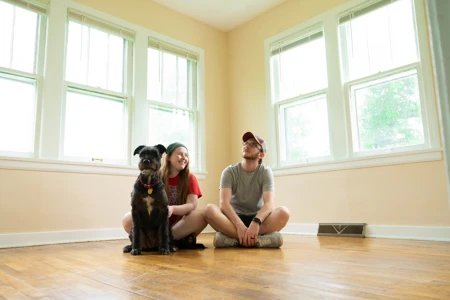If you’re hoping to get on the property ladder but you have a small deposit you might be asking if Shared Ownership is right for you. But while you might have heard of Shared Ownership you might not be too clear on what it is. That’s why we’ve put this article together to get you fully in the picture.
What is Shared Ownership?
In a nutshell with Shared Ownership you buy a share of a property, usually 25%-75%, and you’ll pay rent on the remaining share.
What are the pros and cons of Shared Ownership?
So is Shared Ownership right for you? Well if you’ve got a limited budget one of the major advantages of Shared Ownership is that because you’re only buying a share of a property this means you’ll need a smaller mortgage. And in turn this means you’ll need a smaller deposit too.
Who can apply?
The scheme isn’t just for first time buyers, it’s open to other people too; for example if you used to own a home but you can’t afford to buy one now.
But before you start searching for properties, you’ll need to make sure you meet the eligibility criteria. For example your household income must be £80,000 or less, or £90,000 or less in London.
Shared Ownership mortgages: How do they work?
So how does it work when it comes to Shared Ownership mortgages? Well you’ll only need a mortgage for the share you’re buying.
That means if you’re buying a 50% share of a £250,000 property with a 5% deposit:
- Your share of the property would be £125,000;
- This means your deposit would be £6,250;
- And your landlord’s share would be £125,000;
- So you would need a mortgage of £118,750.
But if you’re doing your research and asking is Shared Ownership right for you don’t worry about working out these figures yourself. That’s because if you speak to a mortgage adviser they’ll explain the process to you.
What are the costs?
On top of your deposit, you might be asking if there are any more Shared Ownership fees. Once you’ve found your ideal property you will usually have to pay a reservation fee. This is usually up to £500 and will be taken off the final amount you’ll pay. Plus there are additional costs like any legal fees as well as stamp duty on your share (if that applies). Also there might be extra things to pay for after you’ve moved in like a service charge.
Is Shared Ownership right for me?
After you’ve moved into your Shared Ownership home you can usually increase your share – this is called ‘staircasing’. And if you do this, as well as owning a greater share of your home you’ll also pay less rent too. However while you can usually keep buying shares until you own the whole property there are sometimes limits on how much of a share you can buy. So it’s important to check this before you take the plunge.
Shared Ownership Vs Help to Buy Equity Loan scheme
If you’re considering Shared Ownership you might also be looking at the Help to Buy Equity Loan scheme and wondering how they compare. Well, there are some key differences.
For example unlike with Shared Ownership, if you buy through the Help to Buy Equity Loan scheme you’ll buy the whole property. You’ll do this by putting down a 5% deposit, borrowing an equity loan from the government of up to 20% of the property’s value (or up to 40% if the property is in London). And you’ll get a mortgage for the rest.
But the Help to Buy Equity Loan scheme will close to new applicants on 31 October 2022, so you’ll need to move quickly if you’re considering it. And unlike Shared Ownership it’s only open to first time buyers.
Shared Ownership: We can help you
Sound interesting? If you’d like to find out more about Shared Ownership and what your mortgage options are, we have a team of expert advisers ready and waiting to help you. So phone us on 01603 405070 or click here to arrange a call back.
This information on Shared Ownership and the Help to Buy Equity Loan scheme only applies to England.

